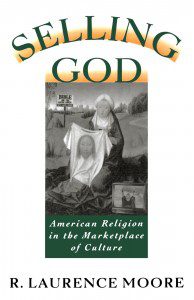
I am a big fan of religious disestablishment. I appreciate the tireless advocacy (and agitation) of my Baptist forbears for freedom of conscience in matters of religion. Over the decades, men such as Thomas Helwys, John Clarke, John Leland, Isaac Backus and the signers of historic Baptist confessions like the First London Confession (1644), The Standard Confession (1660), and The Philadelphia Confession (1742) have opposed state compulsion in matters of religion. As a minority movement, pragmatic concerns played a role, but the main catalyst for these efforts was theological: since each person must give an account to God for his/her own religious decisions, the state should refrain from practices that coerce religious decisions. Although at times Baptists have inconsistently backed those ideals, I am proud to be part of that tradition.
And yet, as I once again revisited the work of Sidney Mead and Nathan Hatch in advance of lectures on disestablishment, the rise of denominations, and the emergence of a religious free market in America, I more clearly perceive some of the unintended consequences of religious liberty. One of these consequences feeds the postmodern tendency to proliferate smaller and smaller circles of primary identity. As the fragmentation of the modern nation-state continues internationally, evangelicalism in America continues to fragment into smaller groups as well. In both cases, identities that once transcended smaller congruences no longer hold sway. While globally, smaller ethnic and tribal identities increasingly eclipse national identification, American evangelicals increasingly embrace smaller and smaller circles of religious identity. Sometimes this is theologically driven, but often it relates to other aspects of identity.
 These changes dovetail with the continuing “commodification of religion” aptly described by R. Laurence Moore. Unable to rely on the state to consistently promote religious practice and belief, in America practitioners competed for adherents. Over time, this religious free market turned adherents into consumers as every American became a potential customer to the denominations. Soon, new groups–Christian and otherwise–arose to compete for adherents in the religious marketplace. Religious disestablishment, which aimed to liberate conscience, created a nation of religious consumers and religious leadership intent on increasing current market share and penetrating new markets. As Baptists, Methodists, and Presbyterians competed for devotees, new religious movements arose to challenge them. This is a well-known story.
These changes dovetail with the continuing “commodification of religion” aptly described by R. Laurence Moore. Unable to rely on the state to consistently promote religious practice and belief, in America practitioners competed for adherents. Over time, this religious free market turned adherents into consumers as every American became a potential customer to the denominations. Soon, new groups–Christian and otherwise–arose to compete for adherents in the religious marketplace. Religious disestablishment, which aimed to liberate conscience, created a nation of religious consumers and religious leadership intent on increasing current market share and penetrating new markets. As Baptists, Methodists, and Presbyterians competed for devotees, new religious movements arose to challenge them. This is a well-known story.
In the late twentieth century, another wrinkle arose as evangelicals launched ministries and churches aimed at a specific “target” demographic, tailoring their message to that particular audience. As postmodern trends break up larger patterns of group identification while simultaneously exalting “community,” evangelical entrepreneurs have increasingly targeted smaller and smaller markets of consumers. What began as an effort to reach suburban communities through the use of surveys and other marketing strategies has now resulted in an effort to further delineate one’s target group. In general, this is done in relation to worship preference (contemporary, traditional, liturgical) or stage-of-life (young marrieds, young families, empty nesters). In the twenty-first century, this approach has expanded (or shrunk) to include hobbies, lifestyles, and vocations as evangelicals perceive an emerging market among among bikers, cowboys, artists, and others. As people demonstrate a willingness to locate their primary identify within a fairly narrow “community,” evangelicals have indulged them, providing churches that embrace that same identity. Although positive in some regards, such efforts leave behind the biblical vision of an diverse church composed of an eclectic mix of people united under the headship of Christ–a vision for which my Baptist forbears also advocated (and agitated).












